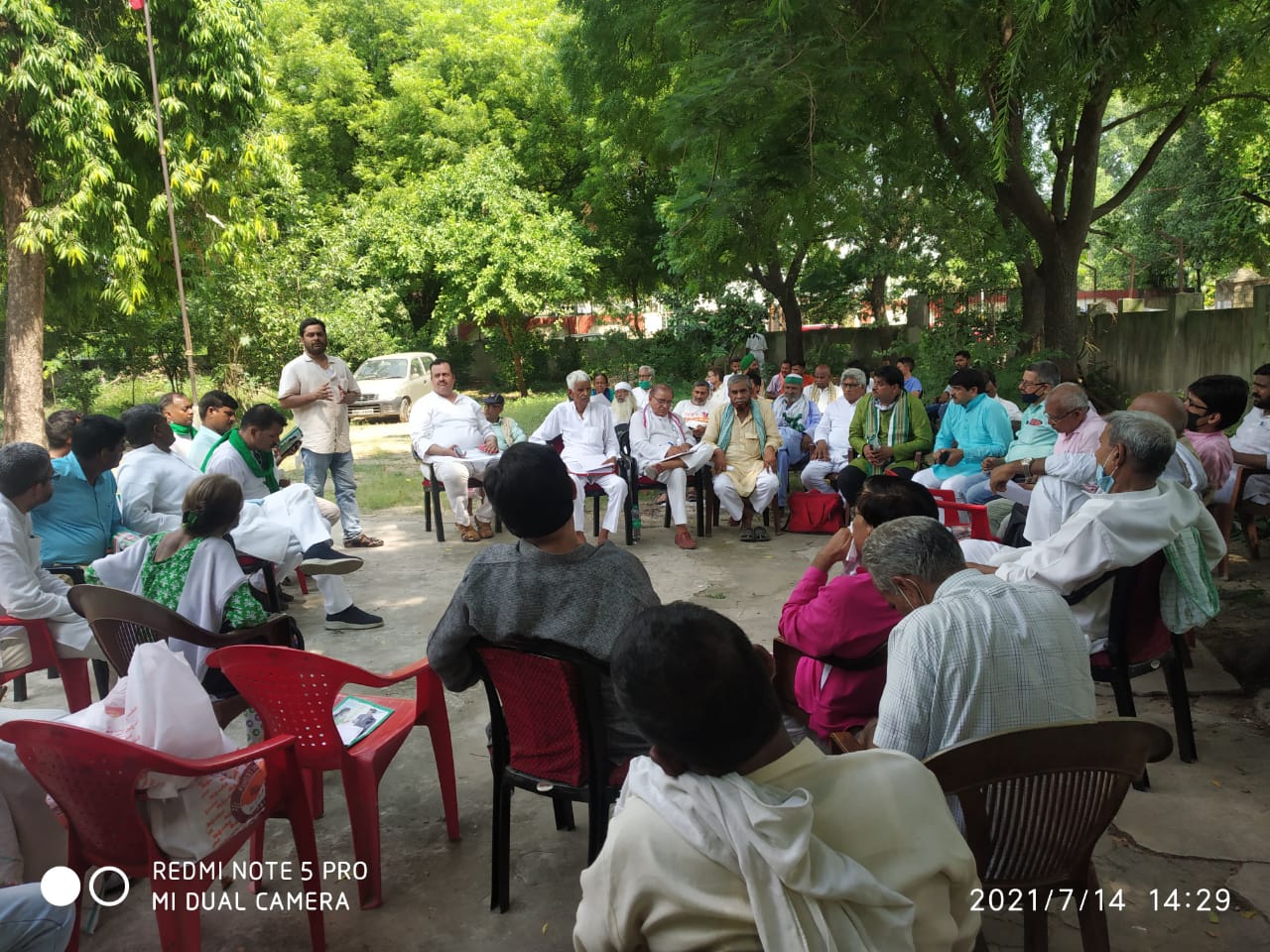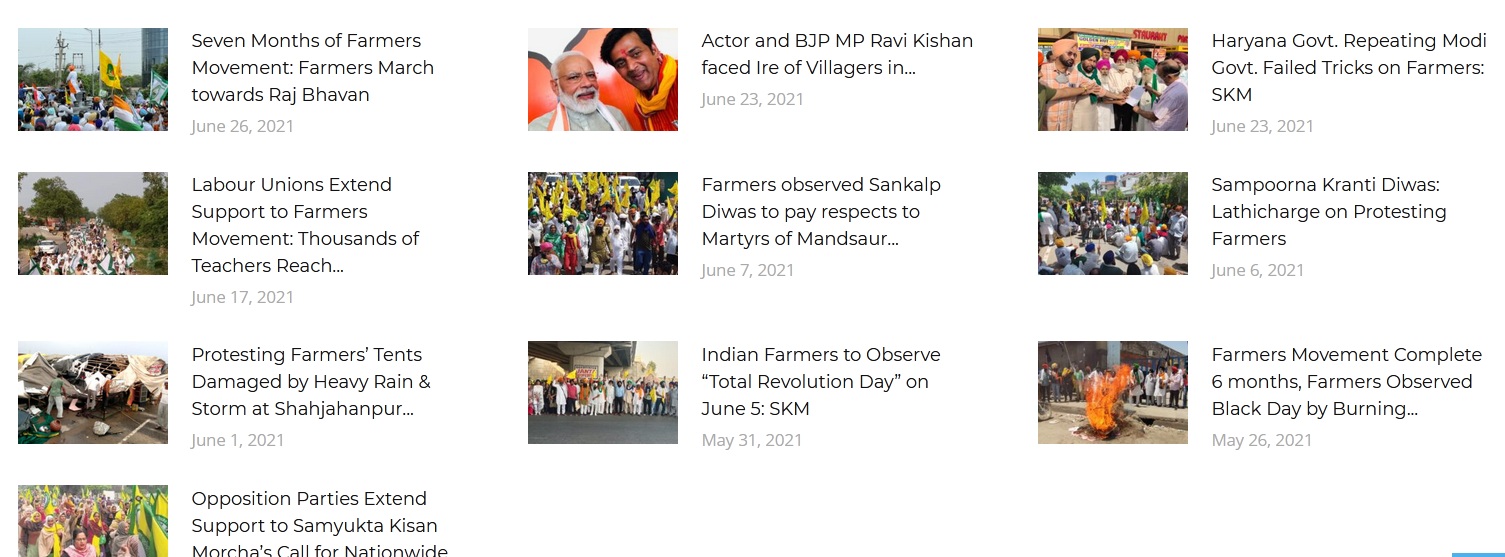Agriculture
Response of SKM on Minster's statement of farmer protests..
Deeply ironic that Govt of India states in Parliament that 'various efforts have been made to end the protests' - Shameful that the Govt has no record of deaths in the current agitation of farmers: SKM
In a written response to a Lok Sabha question (No.337) yesterday, the Minister for Agriculture and Farmers' Welfare stated that the Government has made various efforts to end the protests. Ironically, that is indeed true. The BJP, both in the Union Government and in different states, has indeed made numerous efforts to end the protests, to slap false cases on leaders, to put them behind bars, to cut off supplies to the protest sites, to put barricades around the morchas and so on. The government has done its best to malign the farmers. On the other hand, other replies given by the Government in response to numerous questions are shameful!
The Government did not even articulate the demands of the farmers' movement accurately, on the floor of the Parliament, despite having formal talks with the farmers' representatives about it. On Minimum Support Price, Samyukt Kisan Morcha has been clearly stating that the movement seeks a legal guarantee for all farmers for all agricultural produce, on MSP that is declared with a C2+50% formula, and this has been debated extensively in the country. However, the Government of India chose to present this demand as "Issue related to procurement at Minimum Support Price"!
Minister Narendra Singh Tomar also stated that the "Government is always open to discussion with farmers Union and will remain open to discussion with agitating farmers to resolve the issue". If this was the case, there is no reason why the last round of talks between the farmers' movement and the Government ended on January 22nd 2021, a full six months ago! And the key question that the government chose not to respond to, given that it has no rational response to the same, is why the Government will not repeal the 3 anti-farmer laws.
In another reply (Question No. 297), the Minister shared figures of MSP hikes in percentages, year on year, over the past three years. It is clear that this government's MSP levels are not matching even inflation rates when it announces Minimum Support Prices, and SKM has already pointed this out.
What is more shameful and regrettable is that the Government is saying that it does not have any record of the number of agitating farmers who have died during the movement. SKM would like to remind Minister Tomar and his colleagues and officials, that way back in December 2020, the entire official delegation stood up in silence to pay respects to the many martyrs of the movement. It might be true that this callous government may not have kept records, but the movement has been putting out such information through an open blog site and details are indeed available to governments and others, if they wish to see and act upon the same: https://humancostoffarmersprotest.blogspot.com/ . In this movement, more than
537 farmers have been martyred uptil 10th July 2021.
See list https://humancostoffarmersprotest.blogspot.com/2020/12/list-of-deaths-in-farmers-protest-at.html
“Gramsci at the Delhi Border: Indian Farmers and the Revolution against Inevitability”
https://antipodeonline.org/2021/06/14/gramsci-at-the-delhi-border/ 14th June 2021
Extracts: The ongoing farmer and worker protest in India presents a confounding moment in global history. .. For six months they have remained at a tense deadlock with the government. During that time, the protest has grown to encompass diverse strands of Indian society...cutting across caste, religious, gender and class lines.....this protest is not led by a single, secretive party, nor is it driven by the objective of seizing political power. Even in the face of severe repression, the protest has eschewed the use of violence.
Indian farmers ..fear these laws will lead to their gradual impoverishment and eventual eviction from agriculture altogether. .. the government and its supporters repeatedly claim that cultivation has become stagnant, and that a greater proportion of people need to be moved into other occupations. Yet instead of addressing the technical problems in agricultural policy, or developing greater local industrial capacity, it is content to allow private corporations to leverage their immense purchasing power to manipulate prices and control the food supply-chain. Market imperatives will then completely dictate cultivation practices, setting off waves of uncertainty, indebtedness and consolidation in the countryside. Far from “reforms”, these laws are little more than a license for corporate monopolizing that will result in rural displacement.
In this sense, the Indian government is pursuing a derivative strategy of accumulation.. a warped attempt to follow the trajectory of 16th–18th century England, where peasants were forcibly expelled from the countryside to end up in cities as workers in factories, or as soldiers and settlers in various imperial ventures.
..21st century India scarcely offers the same chimeric possibilities: remunerative manufacturing jobs are pitifully few; there is no scope for colonizing entire continents. A more likely prospect for ex-farmers will be to join the swelling ranks of the urban poor to find whatever haphazard work is available, while a fraction desperately seeks migration abroad.
The farmer’s protest is therefore a revolt against capitalist inevitability. It embodies a critique of the stale logics of deregulation, privatization and dispossession.
Small-scale independent cultivation can be made viable.Public investment and localized regulation can become efficient. In Panjab several initiatives are underway for joint cultivation and resource-pooling which involve large numbers of farmers and even landless laborers. These techniques would be both equitable and sustainable, and scalable, if given the right support.
Private enterprise, will lead to mono-cropping, chemical-dependence and factory-farming. The primary aim of a corporation is to endlessly pursue increasing profit every quarter and year, regardless of the rise in inequality or damage to ecology. ..
The fortunes of the struggle at the borders of Delhi thus have implications for the rest of the world. .. Indian farmers are battling to articulate new kinds of economic rights, to subvert current neoliberal orthodoxy in order to place collective wellbeing at the center of democratic politics.
"Modi Gaddi Chhod" campaign across UP on 9th August Quit India Day. A big farmer rally will be organized at Ghoshi in Mau district on 9th August. Along with holding farmer rallies in Awadh, Purvanchal, Moradabad and Bundelkhand regions, it has been agreed to hold a big joint rally of farmers in Lucknow in October.,.
."Uttar Pradesh Kisan Coordination Committee" to be formed by joining all the organizations to intensify the farmers' movement in Uttar Pradesh .All the organizations associated with the All India Kisan Sangharsh Coordination Committee, the Kisan United Front, organizations associated with the Ghazipur Border Committeewill be included.

